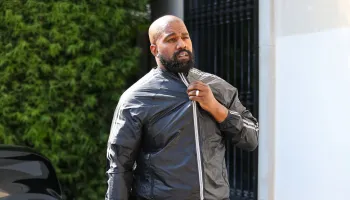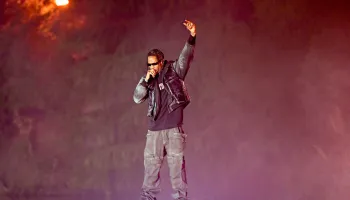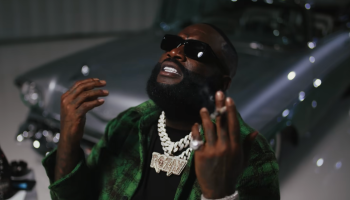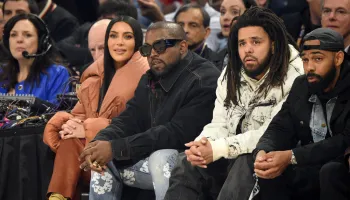Violence is engraved in America’s history from the Revolutionary War, to the decimation of native tribes, to slavery; and it’s perpetuated in a vicious systematic cycle that disproportionately affects African Americans including Arthur “Silky Slim” Reed who was raised in an impoverished neighborhood of South Baton Rouge, Louisiana.
At age 14, Silky was imprisoned on charges of attempted murder and armed robbery and spent the next 17 years in and out of lock up and entrenched in gang life. After a chance encounter with himself, however, he was able to forge a new path as a community activist that has led him to be a keynote speaker for the NAACP, a feature in “The Wall Street Journal,” and have a contract as a mentor with the Louisiana school system.
Recently releasing his DVD “To Live and Die in Amerikkka,” Silky puts the camera on the Amerikka they don’t want the world to see.
After the jump, peep Hip-Hop Wired’s interview with former gang banger as well as more footage of how he turned his life around. [More]
In 2003, he founded Stop The Killing, Inc., an organization through which he speaks to tens of thousands of youth to inspire them to choose differently than he did at their age; and this year he’s released a documentary, “To Live and Die in Amerikkka” that features package Gregory, Jesse Jackson, and Tavis Smiley.
In just a few weeks the DVD has already sold near 10,000 units around the nation. Silky spoke with Hip-Hop Wired to get insight on why this movie about death culture is so alive.
Hip-Hop Wired: Congratulations on the success of this documentary. Why is it titled “To Live and Die in Amerikkka,” particularly spelled that way, with the three K’s?
Silky Slim: The three K’s have been one of the most controversial issues in American history, but the three K’s that’s used in the spelling for “To Live and Die in Amerikkka” actually stands for “Kids Killing Kids” …This is a modern [Klu Klux] Klan that’s killing each other, it’s a civil war that the media is not addressing… these are a bunch of individuals who have taken up arms against themselves and are actually killing each other out.
Hip-Hop Wired: The images get pretty graphic. Why is it important for us to see that?
Silky Slim: We’re dealing with individuals that have been charged with murder, convicted of murder [but] no one has actually seen the after results of pulling the trigger so we’re showing the after the results of pulling the trigger to show the damage, the destruction that has taken place and the lifeless bodies that these individuals don’t actually get to see after an argument and the gun’s pulled and the bullet can’t be put back in the chamber. We’re showing them first hand this is what you’re doing to someone’s child, this is what you’re doing to someone’s father, this is what you’re doing to your own self because eventually the cycle retakes its place and they’ll end up dead as well.
Hip-Hop Wired: Movies in general often come under scrutiny for glorifying violence; do you think this documentary runs the risk of doing that?
Silky Slim: No… it’s all about how the story line is created. I mean, Hollywood creates story lines that definitely would program individuals to become violent. Our concept is that we’re showing you the effects of being violent and this isn’t the way to be. This is a very strategically planned story line with knowledge and guidance… unfortunately most of our individuals are living in poverty stricken areas and they’re going to look at the glamorization of the gangster lifestyle, but we’re showing them what the gangster lifestyle brings on and this is what Hollywood is not showing them… In prison when your pants are sagging was because you had no man and you had to advertise what you were trying to sell. Hollywood is not telling them that, Hollywood is just passing it on as a Hip-Hop fad.
Hip-Hop Wired: Help us get into the head of a violent youngster. When you were 14 you ended up in the pen for attempted murder and armed robbery, what was going through your mind?
Silky Slim: What had happened is I had really let my TV program my mind so I was playing and acting out an image that I really wasn’t and I realized that when I entered the penal system at 14 years old… if you teach your child all of his life that he’s a soldier when the time comes he’s gonna go out there and find a war and unfortunately I found my war inside the state penitentiary of Louisiana and I had to survive by any means necessary so it made me a more violent individual, it made me a bitter individual towards society with things that I didn’t understand and I was like, how could you subject me to this? And the thing was, I subjected myself to it by the choice that I made and that’s why I try to tell kids that choices are the most important things in life.
Hip-Hop Wired: What was your turning around point that led you start Stop The Killing, inc. and this documentary?
Silky Slim: Well, it’s a controversial question because I tell people God and some people say, “no it’s you,” and I’m like no it’s God because there’s a series of events that changed my life. One of the most devastating events that I went through, I was getting ready to shoot an individual that was on the pay phone and he was in another gang and when he turned around on the pay phone he actually had my face on his body and that’s what inspired the DVD cover, a picture of me killing myself. The message that God was giving me, that every time I go out there and pull the trigger I’m actually pulling the trigger on myself… Most of us don’t enjoy life because we never learned to live. I’m not worried about a heaven or a hell after I die because I’ve experienced both here on earth already so when I see all of these things it just gave me the instance to go out and try to warn people about the hell that I had been in.
Hip-Hop Wired: You have package Gregory and Jesse Jackson and Tavis Smiley in this documentary; what were some of the most poignant commentaries they made?
Silky Slim: Tavis Smiley is saying in this documentary that we have a Black president and during the presidential debate the word “poverty” never came up one time and what he is pointing out is that there is direct link between poverty and crime so he’s saying that if we start working on poverty that we can start seeing a decrease in crime. package Gregory is saying that individuals have definitely been conditioned to hate themselves and once you hate yourself you’re not going to love anybody else. That was one of things that I realized about myself. Being in the drug life and being in the gang life I was able to get the material things of the world but I didn’t have love for self so by not having love for self I didn’t have love for individuals.
Hip-Hop Wired: What do you feel like is truly needed to stop the cycle of violence?
Silky Slim: The problem is poverty and when you see individuals that’s willing to work but there’s no jobs, it forces them to other means of survival… if you’re only paying me $7.25 an hour and I know I can’t feed my family off of that, you’re forcing me back into crime… We need to take the jobs that they’re capable of doing like janitorial work and sanitation work and get them $10 an hour if you’re serious about fighting crime.
Hip-Hop Wired: So what do you hope the impact will be with this movie?
Silky Slim: I hope that that movie has the same impact that God had on me which is look at what you’re doing to each other; no one else is doing anything to you. It’s impossible for this generation to say that the Klu Klux Klan is killing them, that the fight for Blacks could no longer be taken to the Department of Justice because Blacks are the biggest enemy of themselves in 2010… try to get back into the frame of living and stop being in the death culture.
For more information on this DVD and Silky Slim, log on to www.stopthekillinginc.org.















